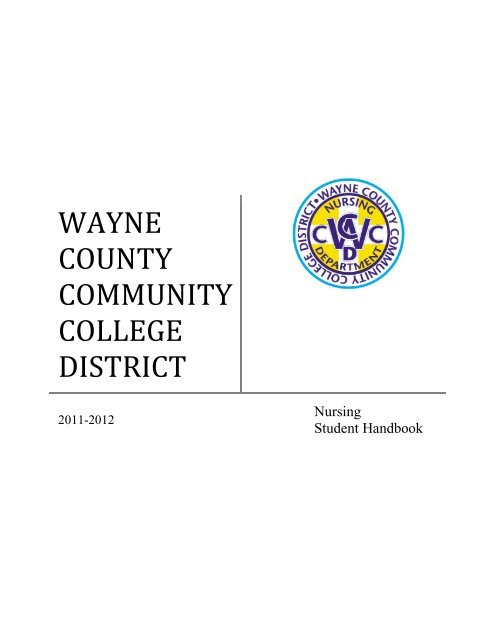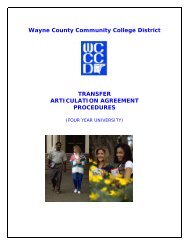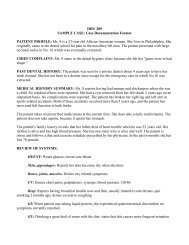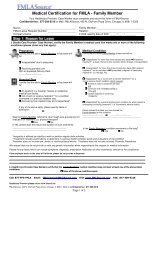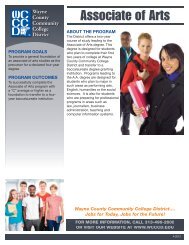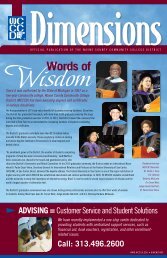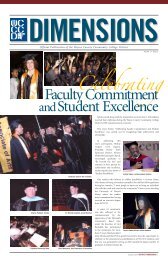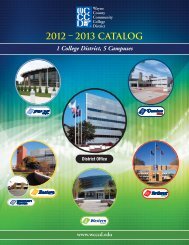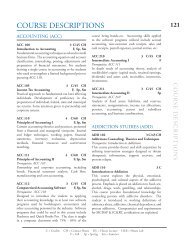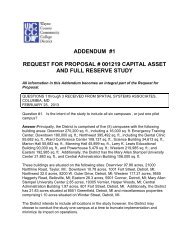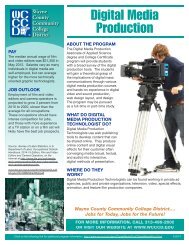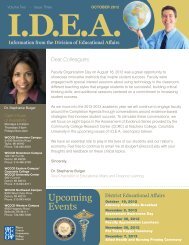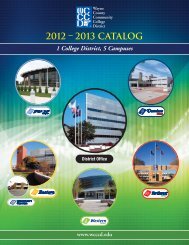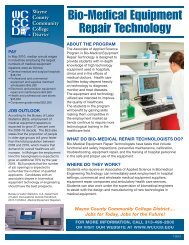Nursing Student Handbook - Wayne County Community College
Nursing Student Handbook - Wayne County Community College
Nursing Student Handbook - Wayne County Community College
Create successful ePaper yourself
Turn your PDF publications into a flip-book with our unique Google optimized e-Paper software.
WAYNE<br />
COUNTY<br />
COMMUNITY<br />
COLLEGE<br />
DISTRICT<br />
2011-2012<br />
<strong>Nursing</strong><br />
<strong>Student</strong> <strong>Handbook</strong>
<strong>Nursing</strong> Division<br />
<strong>Nursing</strong> <strong>Student</strong> <strong>Handbook</strong><br />
2011-2012<br />
The <strong>Nursing</strong> <strong>Student</strong> <strong>Handbook</strong> provides to the nursing student information about<br />
<strong>Wayne</strong> <strong>County</strong> <strong>Community</strong> <strong>College</strong> District’s (“WCCCD”) nursing program, its<br />
curriculum, policies and other valuable information essential for the successful<br />
completion of the program. It is critical that all nursing students read this<br />
handbook, refer to it throughout their studies and comply with the policies it sets<br />
forth. It contains rules governing the appropriate conduct for students and their<br />
participation in classroom, clinical and related activities, as well as the policies<br />
and procedures of the program.<br />
All students are responsible for compliance with current rules, policies and<br />
procedures contained in the <strong>Handbook</strong>. All such rules, policies and procedures<br />
are subject to change at any time at the discretion of the <strong>College</strong> and/or the<br />
nursing program. As revisions are made students must comply with updated<br />
rules, policies and procedures as they proceed toward completion of the program.<br />
Additionally, nursing students are required to comply and conduct themselves<br />
within all other published rules, policies, procedures of the <strong>College</strong>, including,<br />
without limitation, the WCCCD’s <strong>Student</strong> <strong>Handbook</strong>, which is available online at:<br />
http://www.wcccd.edu/students/pdfs/studenthandbook/pdf.<br />
All policies and procedures contained in this handbook are subject to change<br />
at any time at the discretion of the <strong>College</strong> and/or nursing program.<br />
2
<strong>Nursing</strong> <strong>Student</strong> <strong>Handbook</strong><br />
Table of Contents<br />
WCCCD Mission Statement and Values .................................................................................... 4<br />
<strong>Nursing</strong> Program Information .................................................................................................... 5<br />
<strong>Nursing</strong> <strong>Student</strong> Information .................................................................................................. 25<br />
<strong>Nursing</strong> Learning Environment ............................................................................................... 32<br />
Clinical Site Information ........................................................................................................ 37<br />
Alliance for Clinical Experience (A.C.E) ................................................................................ 47<br />
Forms ....................................................................................................................................... 50<br />
Resources .................................................................................................................................. 55<br />
3
<strong>Wayne</strong> <strong>County</strong> <strong>Community</strong> <strong>College</strong> District<br />
Mission Statement<br />
WCCCD’s mission is to empower individuals, businesses and communities to achieve<br />
their goals through excellent accessible services, culturally diverse experiences and<br />
globally competitive higher education and career advancement programs.<br />
WCCCD’s Values<br />
1. Excellence in Teaching and Learning<br />
We value excellence in teaching and learning; we enable students to achieve desired learning outcomes through<br />
individual attention and varied approaches to teaching. Our programs and courses are designed for students from all<br />
backgrounds in an effort to help them achieve academic and career success.<br />
2. Diversity<br />
We value and celebrate the multi-cultural, gender, generational, socio-economical status and experiential global<br />
understanding of our students and others we serve. We nurture increased appreciation and understanding of diverse<br />
cultures, ideas and ways of thinking needed to live as responsible citizens in a global society.<br />
3. <strong>Student</strong> and <strong>Community</strong> Service<br />
We value being a student-centered and community-based community college. We provide a caring, friendly,<br />
responsive, safe and accessible learning environment for students. We are an integral part of the communities we<br />
serve, providing community services that improve the economic, social, cultural and educational life of these<br />
communities.<br />
4. Accountability<br />
We are accountable to the students who depend on us to provide them with a quality education, to the citizens who<br />
support us with their tax dollars and to the businesses that depend on us to provide them with highly trained<br />
employees. We commit to being good stewards of the resources that are provided to us and to being accountable for<br />
creating a positive learning environment that produces student knowledge and skills.<br />
5. Integrity<br />
We exemplify the values of honesty, trust, fairness, reliability, and mutual respect in every aspect of our work.<br />
4
PROGRAM<br />
5
Associate of Applied Science Degree<br />
<strong>Nursing</strong><br />
About the program<br />
The <strong>Nursing</strong> program at WCCCD offers an Associate of Applied Science degree in <strong>Nursing</strong>.<br />
Graduates of the <strong>Nursing</strong> program are eligible to complete the National Council Licensure<br />
Examination for Registered Nurses (NCLEX-RN). Program requirements include specific<br />
courses in the nursing major and general education. The <strong>Nursing</strong> program is designed to prepare<br />
graduates to provide nursing care as staff nurses in a variety of health care settings.<br />
Program goals<br />
The goal of the nursing program is to produce accountable, adaptable generalists who are<br />
prepared to successfully complete the NCLEX-RN exam and function as registered nurses in<br />
diverse care settings.<br />
Program outcomes<br />
The below listed outcomes, found in the WCCCD catalog, are not all-inclusive and are subject to<br />
change based on accreditation requirements.<br />
• <strong>Student</strong>s will practice nursing with professional accountability.<br />
• Demonstrate communication competency in professional interactions.<br />
• Manage health care resources and use the nursing process to meet the health needs of<br />
clients.<br />
• Demonstrate clinical reasoning when planning care for individuals, families and groups.<br />
• Integrate caring constructs into professional nursing activities.<br />
• Integrate teaching and learning principles into health promotion activities for individuals,<br />
families and groups.<br />
• Collaborate with health care team members to promote health of individuals, families and<br />
groups.<br />
• Integrate knowledge from nursing and general education courses when providing nursing<br />
care to individuals, families and groups throughout the lifespan.<br />
6
Philosophy and Conceptual Framework<br />
In the late 20 th century, much of the theoretical work in nursing focused on articulating<br />
relationships among four major concepts: person or client, environment, health, and nursing.<br />
Because these four concepts can be superimposed on almost any work in nursing, they are<br />
sometimes collectively referred to as a meta-paradigm for nursing. The term originates from two<br />
Greek words: meta, meaning “with,” and paradigm, meaning “pattern.” (Kozier & Erb, 2008)<br />
The conceptual framework of the <strong>Nursing</strong> Program at <strong>Wayne</strong> <strong>County</strong> <strong>Community</strong> <strong>College</strong><br />
District is based on these four meta-paradigm concepts taken from Kozier & Erb;<br />
Client:<br />
A client is a person who engages the advice or services of another who is<br />
qualified to provide this service. The term client presents the receivers of health<br />
care as collaborators in the care, that is, as people who are also responsible for<br />
their own health. Thus, the health status of a client is the responsibility of the<br />
individual in collaboration with health professionals.<br />
Environment:<br />
The environment is the internal and external surroundings that affect the client.<br />
This includes people in the physical environment, such as families, friends, and<br />
significant others.<br />
Health:<br />
Health is the degree of wellness or well-being that the client experiences.<br />
<strong>Nursing</strong>:<br />
<strong>Nursing</strong> is the attributes, characteristics, and actions of the nurse providing care<br />
on behalf of, or in conjunction with, the client.<br />
7
Educational Goals<br />
Educational goals for students enrolled in level one and level two classes are described in the table below:<br />
Level I<br />
Level II<br />
Semester One Semester Two Semester Three Semester Four<br />
NUR 110, 111, 112, 118 NUR 114, 116, 119 NUR 210, 212, 218 NUR 214, 216, 219<br />
Demonstrate increased<br />
Demonstrate accountability<br />
Describe metaparadigm<br />
accountability for Practice nursing with<br />
for professional nursing<br />
concepts.<br />
professional nursing professional accountability.<br />
practice.<br />
practice.<br />
Identify effective<br />
communication skills.<br />
Use the nursing process to<br />
meet the health needs of<br />
clients.<br />
Consider variables when<br />
providing care.<br />
Describe caring constructs.<br />
Describe effective teaching<br />
and learning principles.<br />
Describe roles of health care<br />
team members.<br />
Consider knowledge from<br />
nursing and general<br />
education courses when<br />
planning care.<br />
Integrate communication<br />
skills into professional<br />
interactions.<br />
Develop nursing care<br />
strategies, using the<br />
nursing process, to meet<br />
the health needs of clients.<br />
Apply critical thinking<br />
skills when providing care.<br />
Apply caring constructs<br />
when performing nursing<br />
procedures.<br />
Apply principles of<br />
teaching and learning into<br />
the plan of care for<br />
individuals, families and<br />
groups.<br />
Cooperate with members<br />
of the health care team to<br />
manage the nursing care of<br />
individuals, families and<br />
groups.<br />
Apply knowledge from<br />
nursing and general<br />
education courses when<br />
planning care.<br />
Communicate with<br />
increasing competence in<br />
professional interactions.<br />
Develop nursing<br />
strategies, considering<br />
health care resources and<br />
using the nursing process,<br />
to meet the health needs<br />
of clients.<br />
Apply critical thinking<br />
skills when planning care<br />
for individuals, families<br />
and groups.<br />
Apply caring constructs<br />
into professional nursing<br />
activities.<br />
Apply principles of<br />
teaching and learning into<br />
health promotion activities<br />
for individuals, families<br />
and groups.<br />
Cooperate with health<br />
team members to promote<br />
health of individuals,<br />
families and groups.<br />
Apply additional<br />
knowledge from<br />
progression in nursing and<br />
general education<br />
sequence when providing<br />
nursing care to<br />
individuals, families and<br />
groups throughout the<br />
lifespan.<br />
Communicate competently in<br />
professional interactions.<br />
Manage health care resources<br />
and use the nursing process<br />
to meet the health needs of<br />
clients.<br />
Demonstrate clinical<br />
reasoning when planning<br />
care for individuals, families<br />
and groups.<br />
Integrate caring constructs<br />
into professional nursing<br />
activities.<br />
Integrate teaching and<br />
learning principles into<br />
health promotion activities<br />
for individuals, families and<br />
groups.<br />
Collaborate with health care<br />
team members to promote<br />
health of individuals,<br />
families and groups.<br />
Integrate knowledge from<br />
nursing and general<br />
education courses when<br />
providing nursing care to<br />
individuals, families and<br />
groups throughout the<br />
lifespan.<br />
8
NURSING PROGRAM CURRICULUM<br />
The nursing program at WCCCD is designed for completion within three years, inclusive of prerequisite<br />
courses. The actual NUR course sequence is designed for completion in two calendar<br />
years. <strong>Student</strong>s seeking a part-time course load can accomplish that objective by completing<br />
more or all of the general education courses prior to seeking admission in the nursing program.<br />
Cr. No. Courses Title Credit<br />
Pre-requisite courses<br />
ENG 119 English I 3 credits<br />
BIO 240 Human Anatomy & Physiology I 4 credits<br />
BIO 250 Human Anatomy & Physiology II 4 credits<br />
BIO 295 Microbiology 4 credits<br />
PSY 101 Introductory Psychology 3 credits<br />
Pre-requisite total: 18 credits<br />
Semester I<br />
DT 130 Introduction to Nutrition 3 credits<br />
HSC 100 Medical Measurements and Mathematics 1 credit<br />
NUR 110 <strong>Nursing</strong> Foundations – Theory 2 credits<br />
NUR 111 <strong>Nursing</strong> Foundations – Skills Lab 2 credits<br />
NUR 112 Medical/Surgical <strong>Nursing</strong> I – Theory and Clinical 4 credits<br />
NUR 118 Physical Assessment 1 credit<br />
Semester total: 13 credits<br />
Semester II<br />
BIO 252 Pathophysiology 4 credits<br />
NUR 114 Obstetric <strong>Nursing</strong> – Theory and Clinical 3 credits<br />
NUR 116 Medical/Surgical <strong>Nursing</strong> II – Theory and Clinical 4 credits<br />
NUR 119 Pharmacology 2 credits<br />
Semester total: 13 credits<br />
Semester III<br />
PSY 200 Lifespan Development 3 credits<br />
SOC 100 Sociology 3 credits<br />
NUR 210 Psychiatric <strong>Nursing</strong> - Theory and Clinical 3 credits<br />
NUR 212<br />
Medical/Surgical <strong>Nursing</strong> III – Theory and Clinical 4 credits<br />
NUR 218 <strong>Nursing</strong> Issues 1 credit<br />
Semester total: 14 credits<br />
Semester IV<br />
ENG 120 English II 3 credits<br />
Elective: American Government 3 credits<br />
NUR 214 Pediatric <strong>Nursing</strong> – Theory and Clinical 3 credits<br />
NUR 216<br />
Medical/Surgical <strong>Nursing</strong> IV – Theory and Clinical 4 credits<br />
NUR 219 <strong>Nursing</strong> Transitions 1 credit<br />
Semester total: 14 credits<br />
Program Total: 72 credits*<br />
*Program totals do not include remedial courses and may not include prerequisites.<br />
9
DESCRIPTION OF NURSING CLASSES<br />
NUR 110<br />
<strong>Nursing</strong> Foundations – Lecture<br />
(2) credits (30 classroom hours)<br />
This course establishes the metaparadigm concepts: client, health, environment, and nursing. In Level I,<br />
first year of the <strong>Nursing</strong> Program, emphasis is on the nursing student as a caregiver.<br />
NUR 111<br />
<strong>Nursing</strong> Foundations – Skills Lab<br />
(2) credits (90 lab practice hours)<br />
The focus of this course is for the student to acquire the necessary nursing skills for progression to clinical<br />
sites in subsequent courses. This course is organized according to metaparadigm concepts: client, health,<br />
environment, and nursing. In Level I, first year of the <strong>Nursing</strong> Program, emphasis is on the nursing<br />
student as a caregiver.<br />
NUR 112<br />
Medical Surgical <strong>Nursing</strong> I – Theory<br />
(4) credits (30 classroom hours/90 clinical hours)<br />
This course focuses on the nursing care of the peri-operative client, and the client with diabetes. This<br />
course is organized according to metaparadigm concepts: client, health, environment, and nursing. In<br />
Level I, first year of the <strong>Nursing</strong> Program, emphasis is on the nursing student as a caregiver. New nursing<br />
skills that the student will master in the clinical are related to blood transfusion and oral suctioning.<br />
NUR 114<br />
Obstetric <strong>Nursing</strong> - Theory<br />
(3) credits (22.5 classroom hours/67.5 clinical hours)<br />
This course focuses on the nursing care of the obstetric client, newborn and family unit. This course is<br />
organized according to the metaparadigm concepts: client, health, environment, and nursing. In Level I,<br />
first year of the <strong>Nursing</strong> Program, emphasis is on the nursing student as a caregiver. New nursing skills<br />
that the student will master in the clinical are specific to the care of the obstetric client and newborn.<br />
NUR 116<br />
Medical Surgical <strong>Nursing</strong> II – Theory<br />
(4) credits (30 classroom hours/90 clinical hours)<br />
This course focuses on the nursing care of the client with alterations in respiratory, cardiac or<br />
cardiovascular status. This course is organized according to the metaparadigm concepts: client, health,<br />
environment, and nursing. In Level I, first year of the <strong>Nursing</strong> Program, emphasis is on the nursing<br />
student as a caregiver. New nursing skills that the student will master in the clinical are tracheostomy<br />
care and endotracheal suctioning, central line dressing changes, and setting up chest tubes.<br />
10
DESCRIPTION OF NURSING CLASSES<br />
NUR 118<br />
Physical Assessment<br />
(1) credits (30 contact hours)<br />
This course focuses on <strong>Nursing</strong> knowledge and skills necessary to conduct a physical assessment on a<br />
healthy adult. Some common deviations from normal will be included. The level of skill to be attained is<br />
comparable to the admission nursing assessment in an acute care setting. In Level I, first year of the<br />
<strong>Nursing</strong> Program, emphasis is on the nursing student as a caregiver.<br />
NUR 119<br />
Pharmacology<br />
(2) credits (30 classroom hours)<br />
This course focuses on medication groups and medication administration safety factors.<br />
In Level I, first year of the <strong>Nursing</strong> Program, emphasis is on the nursing student as a caregiver.<br />
NUR 210<br />
Psychiatric <strong>Nursing</strong>- Theory<br />
(3) credits (22.5 classroom hours/67.5 clinical hours)<br />
This course focuses on nursing care of clients with psychiatric disorders. This course is organized<br />
according to metaparadigm concepts: client, health, environment, nursing. In Level II, second year of the<br />
<strong>Nursing</strong> Program, emphasis is on the nursing student evolving into the role of the professional nurse.<br />
New nursing skills that the student will master in the clinical are specific to the care of the psychiatric<br />
client.<br />
NUR 212<br />
Medical Surgical <strong>Nursing</strong> III - Theory<br />
(4) credits (30 classroom hours/90 clinical hours)<br />
This course focuses on the nursing care of clients with endocrine, renal, immune and gastrointestinal<br />
disorders. This course is organized according to metaparadigm concepts: client, health, environment,<br />
nursing. In Level II, second year of the <strong>Nursing</strong> Program, emphasis is on the nursing student evolving<br />
into the role of the professional nurse. New nursing skills that the student will master in the clinical are<br />
ostomy care and peritoneal dialysis.<br />
NUR 214<br />
Pediatric <strong>Nursing</strong> - Theory<br />
(3) credits (22.5 classroom hours/67.5 clinical hours)<br />
This course focuses on nursing care of the pediatric client. This course is organized according to<br />
metaparadigm concepts: client, health, environment, nursing. In Level II, second year of the <strong>Nursing</strong><br />
Program, emphasis is on the nursing student evolving into the role of the professional nurse. New nursing<br />
skills that the student will master in the nursing lab in this course are specific to the care of the pediatric<br />
client. New nursing skills that the student will master in the clinical in this course are specific to the care<br />
of pediatric clients.<br />
11
DESCRIPTION OF NURSING CLASSES<br />
NUR 216<br />
Medical-Surgical <strong>Nursing</strong> IV - Theory<br />
(4) credits (30 contact hours/90 clinical hours)<br />
This course focuses on nursing care of clients with neurologic, musculo-skeletal, hematologic, and<br />
oncologic disorders. This course is organized according to metaparadigm concepts: client, health,<br />
environment, and nursing. In Level II, second year of the <strong>Nursing</strong> Program, emphasis is on the nursing<br />
student evolving into the role of the professional nurse. New nursing skills that the student will master in<br />
the clinical are traction and adaptive equipment.<br />
NUR 218<br />
<strong>Nursing</strong> Issues<br />
(1) credit (15 classroom hours)<br />
This course focuses on issues within the environment of care, as well as professional nursing issues.<br />
This course is organized according to metaparadigm concepts; client, health, environment, nursing. In<br />
Level II, second year of the <strong>Nursing</strong> Program, emphasis is on the nursing student evolving into the role of<br />
the professional nurse.<br />
NUR 219<br />
<strong>Nursing</strong> Transitions<br />
(1) credit (15 classroom hours)<br />
This course focuses on environment of care and professional nursing issues. In Level II, second year of<br />
the <strong>Nursing</strong> Program, emphasis is on the nursing student evolving into the role of the professional nurse.<br />
Refer to WCCCD college catalog for complete list of all classes and pre-requisites for all classes.<br />
http://www.wcccd.edu/students/pdfs/CATALOG%202011-2012%20FINAL%20WEBds.pdf<br />
12
NURSING STUDENT COMMUNICATION<br />
All academic students receive a free WCCCD <strong>Student</strong> E-Mail Account upon enrollment. This<br />
account provides students with instant access to important student and District information and a<br />
safe and secure method by which to communicate with the nursing program and all WCCCD<br />
faculty, staff and students.<br />
All official college communication to students will arrive through the WCCCD student<br />
e-mail account.<br />
<strong>Student</strong>s are also encouraged to read the postings on the nursing bulletin boards located near the<br />
<strong>Nursing</strong> Office on a regular basis. Information may include lottery dates and times, grades,<br />
scholarships, schedule changes, job opportunities, etc.<br />
ACADEMIC SUPPORT<br />
A full-time faculty member will be assigned to each student early in the first semester of the<br />
nursing program and for its duration. The assignment of these instructors is intended to facilitate<br />
a student’s progression through the program and to make them available to address student<br />
concerns and discuss future goals. It is the nursing student’s responsibility to initiate contact<br />
with the assigned faculty member.<br />
NURSING STUDENT REGISTRATION PROCESS<br />
Registering for any NUR class must follow this process:<br />
• WCCCD Academic registration form to be attained in the <strong>Nursing</strong> office. <strong>Student</strong><br />
must receive signature of nursing staff member for classes in order to register for<br />
the term.<br />
• Once registration form is completed and signed, the student precedes IN-<br />
PERSON to the campus registration office to register for NUR courses.<br />
Online registration is not permitted for NUR coded courses.<br />
• Once in-person registration is completed student proceeds to the cashier. <strong>Student</strong><br />
should be prepared to pay the 65% of TOTAL of all registered classes*.<br />
*Failure to pay fees (missing payment deadline, etc.) as required by the <strong>College</strong> may subject the<br />
student to being removed from a course: theory and clinical. Once a student is removed from a<br />
clinical rotation the student is no longer enrolled in that course. After paying the necessary fees<br />
the student registers based on space availability. There is no guarantee of clinical availability in<br />
the current semester. The <strong>Nursing</strong> Program will try to facilitate enrollment as much as possible<br />
given the space limitations. <strong>Student</strong>s who cannot show proof of registration will not be permitted<br />
into the classroom or clinical site.<br />
13
ESSENTIAL FUNCTIONS RELATED TO THE PROFESSION OF NURSING<br />
<strong>Student</strong>s in the nursing program must demonstrate the ability to perform specific cognitive functions<br />
and demonstrate psychomotor skills in order to succeed in the profession of nursing. <strong>Nursing</strong><br />
students must possess the ability to perform all functions that are necessary components of the<br />
nursing program.<br />
The Campus Dean or designate and <strong>Student</strong> Services will determine what reasonable<br />
accommodations may be provided for students with disabilities and will complete an<br />
accommodation letter that will be given to the <strong>Nursing</strong> Program Dean and Campus Dean.<br />
The following Core Performance Standards are necessary for all nursing education programs for<br />
program admission and progression as a recognized standard.<br />
1. Critical Thinking: demonstrate judgment and identify cause/effect relationships in the<br />
clinical setting as well as develop and utilize nursing care plans.<br />
2. Interpersonal skills: demonstrate effective interactions with clients and colleagues from<br />
various social, emotional, cultural, and intellectual backgrounds<br />
3. Communication skills: demonstrate effective verbal and written communication skills while<br />
interacting in all learning environments.<br />
4. Motor skills: demonstrate physical ability to assess clients, perform technical skills<br />
involving gross and fine muscular movements and motor strength.<br />
5. Mobility- demonstrates ability to move effectively in patient care areas; perform CPR.<br />
6. Sensory Integrity: demonstrate ability to effectively assess and care for clients utilizing the<br />
senses of sight, hearing, smell and touch.<br />
Upon admission students are expected to perform in accordance with the<br />
following technical standard/physical abilities and skills for the duration of their<br />
matriculation in the WCCCD nursing program. <strong>Student</strong>s must be able to fully<br />
satisfy (to the level of 100%) each of the criteria set forth as a standard. If a<br />
student is unable to perform the requirements at a 100% level the student must<br />
provide an explanation and additional information. The student may request<br />
reasonable accommodation with appropriate documentation from the Dean of<br />
<strong>Nursing</strong> or the Associate Dean of <strong>Nursing</strong>. The program will make every<br />
reasonable effort to satisfy the student’s request for an accommodation.<br />
14
7. Physical requirements<br />
Technical Standards/ Physical<br />
Abilities & Skills<br />
Mobility<br />
Motor Skills<br />
Hearing<br />
Visual<br />
Standard<br />
Physical abilities sufficient to<br />
move independently from room<br />
to room, walk in hallways,<br />
maneuver in small places such as<br />
patient rooms, medication<br />
rooms.<br />
Gross and fine motor skills to<br />
practice safe and efficient patient<br />
care. Sufficient manual dexterity<br />
to manipulate equipment in the<br />
patient care setting.<br />
Auditory ability sufficient to<br />
monitor and assess health needs.<br />
Visual ability sufficient for<br />
observation and assessment<br />
necessary to provide safe patient<br />
care.<br />
Examples<br />
Walking independently with<br />
patients from department to<br />
department, around the<br />
patient room, down the<br />
corridor, from one patient<br />
room to another to take care<br />
of all patients on a team and<br />
to assist in the transport of<br />
all patients from bed to bed,<br />
bed to chair. Walking,<br />
standing, sitting for long<br />
periods of time, stooping,<br />
lifting patients weighing,<br />
squatting, reaching, twisting,<br />
bending, pushing, pulling,<br />
dragging, climbing.<br />
Manual dexterity to start a<br />
patient’s intravenous line, set<br />
alarms on monitors, draws<br />
up and gives injections to<br />
patients without extraneous<br />
movement.<br />
Auscultation of breath<br />
sounds, heart sounds, blood<br />
pressure, bowel sounds,<br />
hearing alarms, call bells<br />
telephones in patient care,<br />
converse with patients,<br />
family and staff from<br />
varying distances with<br />
varying audible sounds.<br />
Reading patient charts/flow<br />
sheets/monitors, drawing up<br />
and administering<br />
medications, assessing<br />
patient skin tones, reading<br />
thermometers, assessing<br />
wound status, non-verbal<br />
behaviors.<br />
15
Tactile<br />
Communication<br />
Interpersonal<br />
Critical Thinking<br />
Tactile ability sufficient for<br />
physical assessment and to<br />
provide safe patient care.<br />
Communication abilities<br />
sufficient for interaction with<br />
others in coherent and concise<br />
oral and written form.<br />
Interpersonal skills sufficient for<br />
interaction with patients, families<br />
and groups from diverse<br />
backgrounds (cultural,<br />
emotional, intellectual) in a<br />
variety of health care settings<br />
Critical thinking sufficient for<br />
clinical decision-making<br />
Performing palpation, giving<br />
injections, starting IV’s,<br />
sterile and non sterile<br />
dressing changes, urinary<br />
catheterization, assess skin<br />
temperature and texture, and<br />
assist with patient care<br />
activities<br />
Following spontaneous<br />
verbal and/or written<br />
instructions. Is able to<br />
effectively communicate in<br />
English. Must be able to<br />
communicate the patient’s<br />
response to therapy to other<br />
members of the health care<br />
team, document patient<br />
responses to therapy on<br />
health care forms utilizing<br />
various forms of media,<br />
consult with health care team<br />
members/workers in a<br />
professional manner.<br />
Conversing effectively with<br />
patients, families, and<br />
groups and in stressful<br />
patient care situations such<br />
as emergencies.<br />
Competent assessing a<br />
patient in a timely manner<br />
and correctly interpreting<br />
assessment. Readily<br />
responding with appropriate<br />
nursing/medical<br />
interventions and treatment<br />
plans. Can work in isolation<br />
independently for positive<br />
patient outcome.<br />
16
REQUEST FOR TESTING MODIFICATION ON LICENSURE EXAMINATION<br />
<strong>Student</strong>s who require accommodations during testing situations are able to request testing<br />
modifications when making application to take the National Council of Licensing Examination-<br />
Registered Nurse (NCLEX-RN) for State licensure.<br />
PAYMENT OF TUITION & FEES<br />
All tuition, fees and deposits are due at the time of registration. <strong>Student</strong>s who choose the deferred<br />
tuition payment plan must pay a minimum of 65% of total tuition and fee(s) for the current term.<br />
Payments may be made by money order, check, Visa, MasterCard, Discover Card, American<br />
Express or ATM debit card.<br />
<strong>Wayne</strong> <strong>County</strong> <strong>Community</strong> <strong>College</strong> District reserves the right to cancel the registration of any student<br />
who does not make required tuition and fees payment within the specified timeframe.<br />
GRADING SCALE<br />
The following the grading scale applies to the <strong>Nursing</strong> Program:<br />
A 93% - 100%<br />
B 84% - 92.9%<br />
C 75% - 83.9%<br />
D 70% - 74.9%<br />
E ≤ 69.9%<br />
Numerical grades are based on the theory component of the course and will be consistently<br />
recorded to the hundredth place, but will never be rounded up. For example, 69.9 will not be<br />
rounded up to 70%. “Extra credit” assignments are not available. For courses with a clinical<br />
component, students must achieve a “satisfactory” grade in clinical and at least 75% in the theory<br />
component to successfully complete the course.<br />
Evaluation of Progress<br />
Evaluation of student performance is recorded by the instructor in theory, clinical and laboratory<br />
settings. Written test results, clinical performance notes, and laboratory practice are utilized by<br />
the instructor to document evidence of a student’s progress and learning needs.<br />
Weekly evaluation forms are maintained for each clinical student to document the extent of<br />
achievement of expected behaviors for the clinical experience. The date, time and place are<br />
noted with a description of the behavior observed.<br />
<strong>Student</strong>s should expect a midterm evaluation from their clinical instructor.<br />
17
REQUESTING GRADE CHANGES<br />
<strong>Student</strong>s are encouraged to establish a relationship with their instructors and to discuss their<br />
progress regularly. If you feel you have received a grade that has been awarded unfairly or<br />
incorrectly, please follow the below grade appeal process from the WCCCD student handbook:<br />
OFFICIAL PROCEDURE FOR GRADE APPEAL<br />
The Grade Appeal Procedures are THE ONLY method by which a student may challenge a final<br />
grade issued by an instructor at <strong>Wayne</strong> <strong>County</strong> <strong>Community</strong> <strong>College</strong> District.<br />
1. The student must contact the instructor after the grade is issued to discuss any change in<br />
grade. You must initiate contact within 90 calendar days of the end of the semester (or<br />
session) during which you were enrolled. If you are unable to contact your instructor,<br />
contact the Campus Instructional Administrator for assistance.<br />
2. If the student is dissatisfied with the instructor’s response, the student may appeal the<br />
instructor’s decision by obtaining a <strong>Student</strong> Statement Grade Appeal Form from the<br />
<strong>Student</strong> Services (Administrative) Office at any WCCCD campus, who will advise<br />
students on their Rights & Responsibilities.<br />
3. The <strong>Student</strong> Information and Course Information section is to be filled out completely<br />
and reviewed by instructional staff.<br />
4. The student must complete the <strong>Student</strong> Statement Grade Appeal Form according to<br />
the directives and provide necessary documentation (copies) and any pertinent<br />
information.<br />
5. The student returns the completed packet to the appropriate Instructional Administrator<br />
as directed on the bottom of the form.<br />
6. Upon receipt of the completed package, the Instructional Administrator will request the<br />
instructor to complete the Instructor’s Statement Grade Appeal Form.<br />
7. Upon receipt of the completed package or, upon failure to receive the Instructor’s<br />
Statement within 14 calendar days of the mailing date, the Instructional Administrator<br />
shall either sustain the instructor’s grade or recommend a grade change to be carried out<br />
by the instructor. This decision shall be mailed to both the student and the instructor (See<br />
Grade Appeal Statement – Instructional Administrator). Failure to receive a response<br />
within 14 days from the instructor does not constitute or imply a grade will be changed<br />
without proper documentation from the student.<br />
18
8. A recommendation to change a grade requires that the instructor complete and submit a<br />
Change of Grade form to the Instructional Administrator within 14 calendar days after<br />
receiving the written notice of the student grade appeal. An administrative change of<br />
grade is made when the instructor fails to comply or is unable to complete the request.<br />
9. Either the instructor or the student may appeal the decision in writing within ten working<br />
days to the GRADE APPEAL COMMITTEE, c/o Vice Chancellor of Educational<br />
Affairs.<br />
10. If the grade is appealed, the appeal shall be heard by a grade appeal committee generally<br />
comprised of:<br />
a. One faculty member in the discipline (if possible) but not the instructor<br />
whose grade is in dispute.<br />
i. Faculty are appointed by the faculty collective bargaining unit.<br />
b. One representative appointed by the appropriate <strong>Student</strong> Services<br />
Administrator.<br />
c. The President of the <strong>Student</strong> Government or designee (if possible).<br />
d. The committee shall be chaired by the Vice Chancellor of Educational<br />
Affairs or designee.<br />
11. Both the student and the instructor should be notified of the date, time, and place of the<br />
hearing. Both should be available to the Committee should further clarification be<br />
necessary. Attendance is not mandatory.<br />
12. The decision of the Grade Appeal Committee will be communicated in writing to both<br />
the student and instructor. Either the student or the instructor may appeal the committee’s<br />
decision to the Executive Vice Chancellor.<br />
13. If an administrative Change of Grade is necessary the signature of the appropriate Vice<br />
Chancellor of Educational Affairs or designee is required.<br />
ACADEMIC PROGRESSION<br />
All students must achieve a “C” or better in all courses in the <strong>Nursing</strong> program in order to<br />
progress in the nursing program. In courses with both theory and clinical components, failure to<br />
achieve a passing grade in either theory or clinical component results in failure of the course.<br />
Clinical evaluations are graded as “satisfactory or unsatisfactory”. <strong>Student</strong>s must successfully<br />
meet all of the clinical objectives to receive a satisfactory clinical evaluation.<br />
Current Semester courses must be completed before progression to the next semester.<br />
19
<strong>Student</strong>s are expected to complete the NUR course sequence within 3 years. <strong>Student</strong>s cannot<br />
proceed to NUR 112 until HSC 100, NUR 110, NUR 111 and NUR 118 are successfully<br />
completed. Thereafter, students must complete both NUR and general education courses as<br />
outlined per semester before proceeding to NUR courses listed in the next semester.<br />
A one-year lapse since last enrolled in a NUR course renders a student ineligible to resume the NUR<br />
sequence.<br />
Exception: students who are military reservists who are called to active duty. Active duty<br />
orders must be submitted, upon receipt, to the Dean of <strong>Nursing</strong>. Upon return from active duty,<br />
the student will be accommodated, provided contact with the <strong>Nursing</strong> Office occurs within 30<br />
days of release from active duty and resumption of course work occurs at the next available time<br />
in the academic cycle.<br />
LEAVE OF ABSENCE<br />
<strong>Student</strong>s may seek approval for a temporary leave of absence from the nursing program not to<br />
exceed 12 months since their last nursing course. Circumstances regarding a leave of absence<br />
need to be discussed with and approved by the Dean of <strong>Nursing</strong> and must be submitted in<br />
writing.<br />
WITHDRAWAL FROM NURSING (NUR) COURSE<br />
<strong>College</strong> withdrawal procedures, as explained in the college’s schedule of classes, are followed<br />
related to deadlines, signatures required, refunds, and grades issued relative to the timing of the<br />
withdrawal for full semester courses. For 7.5 week courses, deadlines are proportionately<br />
adjusted.<br />
First NUR Course Failure or Withdrawal<br />
Upon a first NUR course failure or withdrawal the student will be placed on probation. The<br />
student must contact the <strong>Nursing</strong> Office before entering into the mentoring program.<br />
MENTORING<br />
Step by Step Procedure for Mentoring <strong>Student</strong><br />
The initial workshop for students who are not successful in any NUR core course will be held<br />
within one week after final grades are received. <strong>Student</strong>s will be contacted by college email<br />
informing them of a scheduled date and time for the workshop. Please plan on attending as<br />
scheduled, as attendance will be mandatory. Following the workshop the process will be as<br />
follows:<br />
20
1. <strong>Student</strong> communication to faculty may be through Instructor college email, or office<br />
telephone. Should there be any problem in contacting your mentor please notify the<br />
nursing office at 313-943-4480.<br />
2. Faculty will contact student as soon as possible to arrange meeting dates and times.<br />
<strong>Student</strong> will be given faculty e-mail (school) and office phone number, along with<br />
office hours.<br />
3. Packets for mentoring can be obtained from the <strong>Nursing</strong> Office. Participant<br />
Agreement must be signed by the student. Mentoring booklets will also to be given<br />
to the student. <strong>Student</strong>s should familiarize themselves with contents.<br />
Each interaction packet will contain additional attachments:<br />
A. Participant Agreement Forms (2)<br />
B. <strong>Student</strong> Referral Form<br />
C. Mentor/Mentee Interaction Form<br />
D. <strong>Student</strong> Mentoring Activity Sheet<br />
E. Request to Re-Enter Program<br />
F. Program Information<br />
4. Completed forms should be given to Associate Dean. It is important that a copy of<br />
the student transcript for the current semester be available for evaluation. The<br />
transcript should be brought to the workshop. <strong>Student</strong>s must satisfactorily complete a<br />
minimum 7 1/2 weeks of mentoring to return to the <strong>Nursing</strong> rotation.<br />
<strong>Student</strong>s with two (2) nursing course failures should be referred to the <strong>Nursing</strong> Office to meet<br />
with program designee. Resources that may assist students include, but are not limited to:<br />
A. Multi-Learning Lab – CAT/LASSIE testing<br />
B. Assessment Technologies Incorporated (ATI).<br />
C. Tutors – Hours available by appointment.<br />
D. Discussion Group Meetings<br />
E. Critical Thinking Workshop – Multi-Learning Lab<br />
Designated days & times<br />
F. Study Skills Workshop – Multi-Learning Lab<br />
(Designated days & times)<br />
G. Lab Skills (by appointment).<br />
Please feel free to submit any suggestions to enhance or improve our efforts. After completion<br />
of mentoring, students will be referred to the <strong>Nursing</strong> Office for possible placement. Placement<br />
after mentoring is based on space availability. <strong>Student</strong>s will not be allowed to attend lottery,<br />
unless directed to do so.<br />
21
A student cannot proceed to another NUR course until both the clinical and theory<br />
components of previous courses are successfully completed.<br />
Second NUR Course Failure or Withdrawal<br />
<strong>College</strong> policy on student re-entry and retention in career programs states: Two (2)<br />
failures in core courses in any career program will result in automatic dismissal from that<br />
program.<br />
In addition to the college policy, the nursing program requirements are:<br />
After two withdrawals or two failures or one withdrawal and one failure in any NUR course,<br />
student progression cannot continue without approval of the <strong>College</strong> Wide Re-Entry Committee.<br />
The <strong>Student</strong> who desires to appeal to the <strong>College</strong> Wide Re-Entry Committee for a one-time only<br />
consideration for re-entry must initiate the review process within 2 weeks of the 2 nd failure.<br />
The process is initiated by completing the Departure and Request to Re-Enter form in the<br />
<strong>Nursing</strong> Office and a letter of appeal to the Dean of <strong>Nursing</strong> that includes:<br />
1. Explanation of contributing factors related to past failures or withdrawals<br />
2. Explanation for resolution of causative factors<br />
3. Supporting documentation that outlines a plan for success<br />
The forms will be reviewed and the file will be forwarded to the <strong>College</strong> Wide Re-Entry<br />
Committee.<br />
The <strong>College</strong> Wide Re-Entry Committee may either approve or deny re-entry. If re-entry is<br />
approved any further NUR course failures will result in automatic dismissal from the <strong>Nursing</strong><br />
Program with appeal options exhausted within the <strong>Nursing</strong> Program. <strong>Student</strong> will not be eligible<br />
to re-apply to the <strong>Nursing</strong> Program for at least two (2) years.<br />
Committee discussion is confidential. The student will receive the decision of the Committee<br />
via U. S. Mail. In the event that the <strong>College</strong> Wide Re-Entry Committee denies re-entry, you may<br />
appeal the decision by submitting a request in writing to the Educational Affairs Department of<br />
<strong>Wayne</strong> <strong>County</strong> <strong>Community</strong> <strong>College</strong> District.<br />
INCOMPLETE GRADES<br />
An incomplete “I”, grade is issued only within the <strong>Wayne</strong> <strong>County</strong> <strong>Community</strong> <strong>College</strong> District<br />
guidelines which can be found in the district student handbook. If a student is granted an “I”<br />
grade it will prohibit progression in the NUR sequence until the letter is replaced with a grade.<br />
<strong>Student</strong>s who are awarded an incomplete (I) grade shall complete all agreed course assignments<br />
by the end of two consecutive terms after the term in which the “I” grade was given. The student<br />
22
is charged with the responsibility of completing the course requirements through the instructor<br />
who issued the “I” grade. Failure to complete the course requirements within the two<br />
consecutive term limit shall result in a failing grade of “E” replacing the “I”.<br />
Receiving an “E” grade will not allow student to progress through the <strong>Nursing</strong> program.<br />
APPLICATION FOR DEGREE<br />
Fourth semester students in the <strong>Nursing</strong> Program must follow WCCCD procedures and timelines<br />
to apply for degree. Eligibility to participate in commencement exercises hinges upon meeting<br />
degree completion requirements.<br />
Prior to the semester the student intends to graduate, he or she must:<br />
• Be officially admitted to the program or their major,<br />
• Obtain and complete an application for graduation,<br />
• Submit the completed form to a counselor, program director, or Chief<br />
Academic Officer for review.<br />
Note: The signature of the counselor, program director, or Chief Academic Officer indicates that<br />
they have reviewed the graduation requirements with the student.<br />
It is the student’s responsibility to coordinate all degree or certificate requirements for<br />
completion with the appropriate counselor, advisor, or academic department. If the student does<br />
not complete the graduation requirements outlined in the semester requested on the application,<br />
he or she must file another application in a subsequent semester and pay a new graduation<br />
application fee. The District Records Office will send a letter to the student acknowledging<br />
receipt of the application for graduation and indicating that the student has been placed on the<br />
roster for the next graduation ceremony.<br />
For additional information about graduation requirements, please visit the Admissions and<br />
Records Office at the Northwest Campus in the Welcome Center or at (313) 943-4064.<br />
NURSING PINNING CEREMONY<br />
The Pinning Ceremony for nursing students is held twice each year (in May and December)<br />
along with the Recognition Ceremony for Allied Health Programs. <strong>Nursing</strong> students are also<br />
encouraged to attend the Formal Commencement Ceremony for <strong>Wayne</strong> <strong>County</strong> <strong>Community</strong><br />
<strong>College</strong> District that is held annually in June.<br />
The Pinning Ceremony is an important occasion for nursing students. The distinctive pin they<br />
receive from their school symbolizes professional achievement and the right to practice nursing.<br />
It is also a link to a 1,000 year old tradition. Many years ago in medieval Europe, organizations<br />
23
called guilds appeared; these guilds were responsible for much of the national training of the<br />
time. The emblems worn by the guild members indicated to which guild a worker was a<br />
member. The guild emblems also indicated service to the community. A hospital badge was<br />
given to the educated nurse.<br />
In the late 19 th century many hospitals adopted Florence Nightingales’ ideas and started schools<br />
for the education and training of nurses. Outstanding student nurses who excelled were awarded<br />
gold or silver medals. Gradually, all of the nursing schools started giving a medal or badge to all<br />
graduates of their program. (The Florence Nightingale lamp that is commonly included in the<br />
pinning ceremony is a symbol of the light given by knowledge.)<br />
Today’s nursing pin has become a distinctive mark of nursing excellence and service to others.<br />
Besides identifying the source of the nurse’s education, it also indicates to the patient, and others,<br />
that the nurse has successfully completed a particular nursing program and has the ability to<br />
function as a nurse. It is the intent of the <strong>Nursing</strong> Program at <strong>Wayne</strong> <strong>County</strong> <strong>Community</strong> <strong>College</strong><br />
District to educate and train highly qualified nurses with a sound knowledge of the nursing<br />
profession.<br />
GRADUATION WITH HONORS<br />
<strong>Student</strong>s who complete degree requirements with exceptionally high scholastic averages are<br />
eligible to receive degrees with honors. Those who have earned a grade point average of 3.75-<br />
4.00 are eligible to be graduated Summa Cum Laude; a grade point average of 3.50-3.74, Magna<br />
Cum Laude; a grade point average of 3.25-3.49 Cum Laude. In computing the grade point<br />
average, all courses taken at <strong>Wayne</strong> <strong>County</strong> <strong>Community</strong> <strong>College</strong> District are considered.<br />
APPLICATION FOR REGISTERED NURSE LICENSURE<br />
<strong>Student</strong>s receive information about application for licensure during the fourth semester of the<br />
<strong>Nursing</strong> Program. The Dean of the <strong>Nursing</strong> Program certifies each applicant as having met<br />
<strong>Nursing</strong> Program requirements following completion of the fourth semester and determination of<br />
grades, completion of required NCLEX-RN review program(s) and completion at the required<br />
level of performance of the program standardized exit test.<br />
24
STUDENT<br />
25
PROFILE OF THE SUCCESSFUL NURSING STUDENT<br />
Interviews with our students reveal that those who are successful on NCLEX- RN Examinations<br />
have these characteristics:<br />
1. Prepare prior to class periods, including all assigned readings.<br />
2. Establish regular hours of study (study 2-3 hours per credit per week).<br />
3. Review all course material throughout the program transferring knowledge from one<br />
course to the next.<br />
4. Follow the course objectives and performance behaviors to guide their study.<br />
5. Seek out challenging clinical experiences.<br />
6. Maintain at least a "B" average in nursing courses.<br />
(<strong>Student</strong> must attain a minimum of a C average for progression)<br />
7. Participate in study groups and/or have a study partner.<br />
8. Take the standardized competency tests and utilize the resources provided.<br />
9. Balance work, home and academic schedules.<br />
It is important that the student assumes full responsibility for his/her own learning and<br />
demonstrates it through:<br />
1. Frequent conferences with the instructor at his/her announced office hours.<br />
2. Prompt attendance at all planned learning experiences.<br />
3. Frequent self-evaluation to determine progress towards goals.<br />
4. Early and continuous use of the <strong>College</strong>'s Multi-Learning Lab and the <strong>Nursing</strong><br />
Learning Lab.<br />
5. Meeting with assigned faculty for assistance in course planning and progression.<br />
<strong>Student</strong>s can further enhance their learning by:<br />
1. Using NCLEX-RN review materials including text and online resources to prepare.<br />
2. Practicing technical skills in the Learning - Practice Laboratory.<br />
3. Using online tools such as:<br />
OWL – Purdue Online writing lab<br />
http://owl.english.purdue.edu/owl/resource/560/01/<br />
WCCCD Learning Resource Centers<br />
http://www.wcccd.edu/dept/learning_resource_center.htm<br />
26
STANDARDIZED TESTING: Self-Directed Coaching and Enhancement Program<br />
WCCCD <strong>Nursing</strong> program has partnered with Assessment Technologies Institute, LLS (ATI) to<br />
provide students with a complete diagnostic testing and coaching program. This educational<br />
program assists students during the <strong>Nursing</strong> program to help prepare for the NCLEX-RN. The<br />
website is: https://atitesting.com/Home.aspx<br />
This program will help assess and identify weaknesses in the mastery of nursing content, and<br />
provide a means of addressing these weaknesses as student’s progress through the nursing<br />
program.<br />
The WCCCD nursing program strives for excellence and this testing and coaching program is an<br />
example of the extra steps that the WCCCD nursing program is taking to help students achieve<br />
excellence.<br />
SCHOLASTIC ETHICS CODE<br />
The purpose of this code is to encourage and promote positive learning and ethical student<br />
behavior, define behavior violating scholastic ethics, specify procedures for the determination of<br />
the facts of the alleged violation, and to define penalties. It is the responsibility of the student to<br />
maintain the highest ethical standards in academic achievement within the positive learning<br />
environment provided by the <strong>College</strong>.<br />
GUIDELINES FOR SCHOLASTIC CODE OF ETHICS<br />
The expectation at <strong>Wayne</strong> <strong>County</strong> <strong>Community</strong> <strong>College</strong> District is that the principles of truth and<br />
honesty will be practiced in all academic matters. Therefore, the <strong>College</strong> regards acts of<br />
academic dishonesty, including such activities as plagiarism or cheating, as very serious<br />
offenses. In the event that cheating, plagiarism or other forms of academic dishonesty on the<br />
part of students are discovered, each incident will be handled on an individual basis as deemed<br />
appropriate by the instructor and in consultation with the <strong>Nursing</strong> Dean.<br />
The following is a guide to assist students in observing positive behavior in scholastic ethics:<br />
• <strong>Student</strong>s must do their own work and submit only their own work on examinations,<br />
reports and projects, unless otherwise permitted by the instructor.<br />
• <strong>Student</strong>s can benefit from working in groups. They may collaborate or cooperate with<br />
other students during take-home examinations only if specifically authorized by the<br />
instructor in the class syllabus or at the time of the examination;<br />
• <strong>Student</strong>s must follow all written and/or verbal instructions given by the instructor or<br />
designated <strong>College</strong> representative prior to taking an examination, placement<br />
assessments, test, quizzes and evaluations;<br />
• <strong>Student</strong>s are responsible for adhering to course requirements as specified by the<br />
instructor in the course syllabus.<br />
27
SCHOLASTIC CODE OF ETHICS VIOLATIONS<br />
<strong>Student</strong>s enrolled in college assume the obligation of conducting themselves in accordance with<br />
the highest ethical standards. Actions constituting violations of scholastic ethics include, but are<br />
not limited to the following:<br />
CHEATING<br />
Intentional deceit during the pursuit of academic course work, tests, class assignments or<br />
activities in any testing area, learning center, clinical setting or tutorial session, or in the<br />
gathering of research materials is considered cheating.<br />
Cheating includes but is not limited to:<br />
• Copying from another student’s test paper or knowingly allowing your test to<br />
be copied;<br />
• Using materials during a test that are not clearly authorized by the person<br />
giving the test;<br />
• Collaborating with another student during the test without permission;<br />
• Knowingly using, buying, selling, offering, transporting or soliciting any of<br />
the contents of a test;<br />
• Taking a test for another person, or permitting another student to take a test<br />
for you;<br />
• Bribing or attempting to bribe another person to obtain a passing grade or a<br />
better grade on a test or for a course;<br />
• Intentional misconstruing facts or incidents relating to an evaluated exercise<br />
or assignment that would change the earned grade;<br />
• Electronic, internet transmissions or wireless transfer of data.<br />
PLAGIARISM<br />
The representation of the work of others as one’s own, including the use of term papers written<br />
by others is plagiarism. The use of another’s words, ideas or information without<br />
acknowledgement is also plagiarism. The student should seek guidance from the instructor about<br />
acceptable methods to be used to acknowledge the work and ideas of others.<br />
28
COLLUSION<br />
Obtaining from or giving to another student unauthorized assistance or material in any<br />
course work is collusion.<br />
COMPROMISING INSTRUCTIONAL AND TEST<br />
MATERIALS/MISREPRESENTATION/FRAUD<br />
Unauthorized acquisition, tampering with, or alteration of instructional and/or testing materials<br />
from desks, cabinets, work rooms, classrooms, laboratories, instructor’s offices, tutoring labs,<br />
testing areas, assessment areas, secretarial offices, <strong>College</strong> offices and/or other areas is<br />
compromising test materials.<br />
STUDENT CODE OF CONDUCT VIOLATIONS<br />
Inappropriate and/or illegal student conduct that represents grounds for disciplinary action<br />
includes, but is not limited to the following:<br />
• Dishonesty, such as knowingly furnishing false information to the <strong>College</strong>;<br />
• Forgery, alteration or misuse of <strong>College</strong> documents, records, identification, e-<br />
mail or other electronic information;<br />
• Obstruction or disruption of teaching, administration of the <strong>College</strong>,<br />
disciplinary procedures or other <strong>College</strong> District activities, community service<br />
functions or other authorized <strong>College</strong> District-sponsored activities on or off<br />
<strong>College</strong> premises;<br />
• Physical actions against any person on District-owned or controlled property<br />
or at a <strong>College</strong>/District sponsored or supervised function, or any conduct that<br />
threatens or endangers the health or safety of any person. A physical action is<br />
an action that results in contact with another, or which places a person in<br />
reasonable apprehension of harmful contact;<br />
• Harassment or discrimination of anyone based on race, religion, color, sex,<br />
age, height, weight, marital status, national origin, disability, sexual<br />
orientation or status as a veteran;<br />
• Psychological actions against any person on <strong>College</strong> District-owned property<br />
or controlled property or at <strong>College</strong> District-sponsored or supervised activity.<br />
A psychological action is any action that terrifies, intimidates, threatens or<br />
harasses another, or which places a person in reasonable apprehension of such<br />
29
action. Psychological actions include, but are not limited to: threats, stalking,<br />
harassment and discrimination, including the use of e-mail or telephone<br />
systems to carry out such action; Theft or damage to property of the <strong>College</strong>/<br />
District or of a member of the <strong>College</strong> community or of a visitor to the<br />
<strong>College</strong><br />
• Possession or use of firearms, explosives, dangerous chemicals, substances,<br />
instruments or other weapons that can be used to inflict bodily harm to any<br />
individual or damage to a building or grounds of <strong>College</strong>/ District-owned or<br />
controlled property;<br />
• Failure to comply with directions of <strong>College</strong>/District officials or law<br />
enforcement officers acting in performance of their duties, and/or failure to<br />
identify oneself to these persons when requested to do so;<br />
• Use of tobacco and tobacco products (smoking) in unauthorized areas;<br />
• Verbal abuse and/or abusive behavior, includes excessive profanity, threats,<br />
intimidation, harassment, coercion, and/or other conduct which threatens or<br />
endangers the health or safety of any person or which places them in fear of<br />
being physically abused;<br />
• Unlawful possession, use, sale, or distribution or being under the influence of<br />
any narcotics or other controlled substances or drug paraphernalia, except as<br />
may be expressly permitted by law;<br />
• Engaging in lotteries or other forms of gambling on <strong>College</strong>/ District-owned<br />
or controlled property;<br />
• Leaving unattended minor children on <strong>College</strong>-owned or controlled property<br />
or at <strong>College</strong>/ District-sponsored or supervised functions without making<br />
provisions for them to be cared for or supervised;<br />
• Use of computers for unauthorized purposes and engaging in any activity<br />
aimed at compromising computer systems or network security;<br />
• Inappropriate use of electronic devices such as beepers, cellular telephones or<br />
any other instrument that might be disruptive in an academic setting;<br />
30
• Failure to obtain approval from the Campus President or designee, or<br />
appropriate administrator for solicitation of any type which involves the<br />
<strong>College</strong> student body, <strong>College</strong> employees or visitors; posting or distributing<br />
information of any kind within the premises of the <strong>College</strong>; selling of<br />
merchandise on <strong>College</strong> property by a student or a student organization.<br />
• Any form of sexual misconduct<br />
The above violations are illustrative of the type of conduct that will not be permitted, but are not<br />
intended to be all-inclusive and will result in discipline up to and including expulsion. <strong>Nursing</strong> students<br />
should refer to the district student handbook for complete scholastic code of ethics including ethics<br />
violation disciplinary actions.<br />
31
NURSING LEARNING ENVIRONMENT<br />
32
The Northwest and Western Campus <strong>Nursing</strong> Learning Environments provide students with an<br />
opportunity to practice psychomotor skills, communication and inter-personal skills in a<br />
simulated health care setting. Audiovisual learning aids and computer assisted instruction is<br />
available to reinforce classroom instruction, and help the student practice and learn correct<br />
procedures, techniques and principles of nursing. It is expected that every student will use the<br />
campus lab to become proficient in all skills before and during their clinical experience.<br />
(*<strong>Nursing</strong> Learning Environment is defined as all areas related to the education of the nursing<br />
student. This includes but is not limited to: classroom theory, computer lab and practice skills<br />
lab.)<br />
Learning Environment Conduct<br />
1. <strong>Student</strong> is required to sign in and out when entering and exiting any learning<br />
environment.<br />
2. Smoking, drinking, eating and gum chewing is not permitted.<br />
3. <strong>Student</strong> is not permitted in any learning environment without a faculty member or<br />
administrator present.<br />
4. The practice skills lab is a simulated hospital ward and should be treated with the same<br />
respect as a hospital.<br />
5. Only an officially admitted nursing student is permitted in any learning environment.<br />
6. Personal items not directly related to the study of <strong>Nursing</strong> should be maintained off site.<br />
7. Voice should be kept at a professional and courteous level so as not to disrupt the<br />
learning environment of others.<br />
8. Electronic devices and illegal activities: Electronic devices may be used for professional<br />
needs in the clinical setting (references for drugs, lab tests, etc.). The course instructor or<br />
adjunct clinical instructor prohibit the use of electronic devices (Smart phone etc) that<br />
will violate laws, such as intellectual property rights or copyrights, invasion of privacy,<br />
sexual harassment, copying information from a patient’s confidential record, and using a<br />
camera phone to take inappropriate pictures without the subjects consent in the classroom<br />
or clinical setting. The use of these devices must be in accordance with the clinical<br />
facility.<br />
33
LATEX SENSITIVITY<br />
Latex sensitivity and allergy has grown as a health care concern in recent years. Since a number<br />
of products used in health care are made of latex (gloves, syringes, tubing, etc.), it is imperative<br />
that all applicants to a health care program be made aware of this concern. Individuals with latex<br />
sensitivity may not be able to meet the objectives required to complete a given program or<br />
successfully find employment in health care. Researchers suggest that early recognition and<br />
diagnosis of latex sensitivity may prevent the evolution of the sensitivity to more severe<br />
symptoms. I also understand that such sensitivity may prohibit me from continuing as a student<br />
in the <strong>Nursing</strong> Program.<br />
BACKGROUND CHECK<br />
Consistent with Section 20173 of Michigan Public Health Code and the requirements of clinical<br />
rotation partners, a criminal background check is required for all students in the <strong>Nursing</strong><br />
Program. A criminal background check is conducted in order to verify that the individual has<br />
had no felony convictions within the last fifteen years and that the individual has had no<br />
misdemeanors in the last ten years involving abuse, neglect, assault and battery, criminal sexual<br />
conduct, fraud, or theft.<br />
Once a student is admitted to the program, and undergoes the initial background check, he/she is<br />
required to immediately inform the Dean of <strong>Nursing</strong> if he/she is subsequently arrested for or<br />
convicted of any of the criminal offenses covered by Michigan Public Health Code Section<br />
20173 (set forth above).<br />
Individuals who do not pass a criminal background check, or who are subsequently arrested for<br />
of convicted of criminal offenses covered by Michigan Public Code Section 20173 will not be<br />
placed in clinical component or rotation of any course which requires such clinical component or<br />
rotation. They will be removed from any clinical component or placement. Completion of all<br />
clinical rotations is a graduation requirement. A degree will not be granted to those who do not<br />
successfully complete all required clinical rotations and other programs requirements.<br />
Michigan Public Health Code 20173:<br />
http://legislature.mi.gov/doc.aspx?mcl-333-20173a<br />
34
Learning Environment Dress Code<br />
The purpose of a dress code is to provide safety, asepsis and present a professional image to the<br />
community we serve.<br />
Skills lab dress code<br />
• A clean, plain white, short sleeve t-shirt. T-shirt must be loose fitting, not be transparent,<br />
and have a crew neck collar. No logo or insignia of any kind are permitted with the<br />
exception of the National <strong>Student</strong> <strong>Nursing</strong> Association WCCCD logo T-shirt.<br />
• Pants are to be loose fitting athletic pant bearing no insignia or logo. They should be<br />
plain dark color (gray, black or navy). Pant hemline should not touch the floor. No<br />
hospital scrubs are to be worn.<br />
• Socks are to be clean, plain white and cover the ankle.<br />
• Shoes are to be plain white, leather with closed toe and heel. No high tops permitted.<br />
Shoes and laces are to be clean and in good repair.<br />
• Religious based or professional (i.e. Nun’s Cornette) head covering is permitted. No<br />
other type of head covering is allowed.<br />
• Avoid use of perfumed spray/lotion, aftershave or scented hygiene products. <strong>Student</strong>s are<br />
to be clean, well groomed and free of offensive body odors-including cigarette smoke.<br />
• Nails are to be clean and trimmed to be no longer than 1/8” beyond the tip of the finger.<br />
Nails are to be in natural state only. Artificial/acrylic nails or polish of any type<br />
(including wraps or shellac) are strictly prohibited.<br />
• Makeup is to be conservative and neutral in color. No false eyelashes.<br />
• No visible tattoos.<br />
• A watch with a second hand is required. Wedding band and/or engagement ring are the<br />
only acceptable rings to be worn. Earrings should be small and inconspicuous-one<br />
earring per earlobe. No visible piercing or facial jewelry (including tongue).<br />
• Hair is to be clean, natural color, well-groomed and neat. Long hair must be pulled back<br />
off face and above shoulders. No decorative hair pieces permitted. Beards, mustached,<br />
and side burns must be clean, short and neatly trimmed.<br />
• Undergarments are to be worn. They should be conservative, neutral color and not be<br />
visible.<br />
• WCCCD student ID must be visibly worn at all times. The ID is to be displayed in plain<br />
plastic holder. ID holders are available for purchase in the college bookstore.<br />
A nursing student, who comes to the lab inappropriately dressed, will be sent home and will be<br />
responsible for any make-up or re-enrollment.<br />
35
Classroom/Theory<br />
A nursing student in the classroom setting may choose to wear the skills lab uniform noted above<br />
or opt for professional dress. If professional dress is chosen, it may not be worn in the computer<br />
lab or skills lab areas.<br />
• Clean and pressed suit or dress slacks. Denim is not allowed.<br />
• A dress, dress skirt or skirted/pant suit.<br />
• Dresses and skirts should be at knee length or longer.<br />
• Dress shirts (with ties for men), dress blouse or suit jacket/dressy blazer. Exposure of<br />
cleavage is not acceptable. No halter or transparent tops.<br />
• Dress shoes should be in good repair, clean and if applicable, polished. Women’s high<br />
heels are to be less than 3”.<br />
• Men are required to wear socks. Women are required to wear socks or hosiery.<br />
• Religious based or professional (i.e. Nun’s Cornette) head covering is permitted. No<br />
other type of head covering is allowed.<br />
• Avoid use of perfumed spray/lotion, aftershave or scented hygiene products. <strong>Student</strong>s are<br />
to be clean, well groomed and free of offensive body odors-including cigarette smoke.<br />
• Nails are to be clean and trimmed to be no longer than 1/8” beyond the tip of the finger.<br />
Nails are to be in natural state only. Artificial/acrylic nails or polish of any type<br />
(including wraps or shellac) are strictly prohibited.<br />
• Makeup is to be conservative and neutral in color. No false eyelashes.<br />
• No visible tattoos.<br />
• Wedding band and/or engagement ring are the only acceptable rings to be worn. Earrings<br />
should be small and inconspicuous-one earring per earlobe. No visible piercing or facial<br />
jewelry (including tongue).<br />
• Hair is to be clean, well-groomed and neat. Long hair must be pulled back off face and<br />
above shoulders. No decorative hair pieces permitted. Beards, mustached, and side<br />
burns must be clean, short and neatly trimmed.<br />
• Undergarments are to be worn. They should be conservative, neutral color and not be<br />
visible.<br />
• WCCCD student ID must be visibly worn at all times. Displaying the ID on either a<br />
plain or WCCCD insignia lanyard or a plain plastic holder is acceptable. ID holders are<br />
available for purchase in the college bookstore.<br />
Any student, who comes to the classroom inappropriately dressed, will be sent home and<br />
will be responsible for any make-up or re-enrollment.<br />
(No dress code can cover all contingencies, so students must use a certain amount of judgment in<br />
their choice of professional dress clothing. If you are uncertain about what is acceptable attire<br />
for the classroom, please ask your instructor or a nursing staff member.)<br />
36
CLINICAL SITE<br />
37
CLINICAL PLACEMENT<br />
The clinical placement experience is a significant learning component within the nursing<br />
curriculum. It provides nursing students with the opportunity to use the theory and skills learned<br />
in the classroom and laboratory settings. It is also the place in which nursing students see the art<br />
of nursing applied and begin to develop their unique style. The clinical placement experience is<br />
the synthesizer for nursing education, affording students the opportunity to develop nursing<br />
skills, time management skills and become socialized into the role of the professional nurse.<br />
CLINICAL SITE GENERAL STATEMENT<br />
<strong>Nursing</strong> students are guests at clinical sites and safety of our community is of the upmost<br />
importance. No student shall engage in conduct detrimental to the <strong>College</strong> community. The<br />
conduct of every student should reflect well on the institution and in no case should that conduct<br />
include behavior prohibited by policy, regulation or law. Conduct shall be deemed detrimental to<br />
the <strong>College</strong> community if:<br />
• It results in injury, damage, or loss to students, faculty, or administrative personnel of the<br />
District, or to buildings, structures, or other property under <strong>College</strong> control, or<br />
• It hinders the District in the discharge of its basic responsibilities to maintain an orderly<br />
educational atmosphere and to function without interruption as an institution of higher<br />
learning, or<br />
• It consists of any act or acts prohibited under Municipal, State, or Federal regulations<br />
and law, committed on the premises controlled or owned by the District.<br />
Institutions have the authority to refuse or dismiss any student or the <strong>Wayne</strong> <strong>County</strong> <strong>Community</strong><br />
<strong>College</strong> nursing program for any action deemed detrimental to the clinical placement.<br />
38
PLACEMENT ASSIGNMENTS<br />
Clinical placements are determined at scheduled regular and re-entry lotteries. First semester<br />
lottery is conducted at <strong>Nursing</strong> Orientation. Thereafter, lotteries are held following<br />
determination of grades from the current semester. Dates, times and days are posted outside of<br />
the <strong>Nursing</strong> Office at Northwest Campus. Late arrivals will not participate and will be placed at<br />
a later date. A student who is unable to attend the lottery may designate a proxy participant, who<br />
must provide a signed permission statement to act on the absent student’s behalf. Participating in<br />
a lottery despite being ineligible to do so is considered an ethical violation in the <strong>Nursing</strong><br />
Program, with consequences. Such action deprives fellow students of the opportunity to select<br />
the opening taken by the ineligible student and is not easily corrected in a manner that can be<br />
viewed as fair by deprived students. At a minimum, the offending student will lose the opening<br />
to an eligible student who requests that placement. Circumstances involved may lead to more<br />
severe consequences.<br />
<strong>Student</strong>s should not accept a clinical placement they cannot fulfill as clinical switching will not<br />
be possible after the close of lottery. In the event of a clinical section cancellation, the <strong>Nursing</strong><br />
Office will present the resulting options to displaced, progressing students first. Then, students<br />
repeating courses and students who were not placed at the lottery will be considered.<br />
In the event that a student is employed in the health care field he/she is not permitted to chose<br />
their clinical placement at their place of employment.<br />
CLINICAL ATTENDANCE/TARDINESS POLICY<br />
Punctual attendance at class and clinical time is mandatory.<br />
<strong>Student</strong> is expected to arrive 15 minutes prior to the start of the clinical day. <strong>Student</strong> who is<br />
more than 15 minutes later than start time shall not be allowed to be in clinical and will be<br />
considered absent.<br />
More than one clinical absence will result in being dropped from clinical. If illness extends one<br />
clinical day, student must meet with the Dean of <strong>Nursing</strong> to discuss any available options.<br />
In the event of an illness related absence - the absence will not be noted as excused and will be<br />
counted against the student. The absence must be accompanied by a physician letterhead<br />
document that includes clearance to return to clinical without restrictions and the student may not<br />
exceed one clinical day due to such absence. Due to State of Michigan clinical contact hour<br />
regulations, any missed clinical hours must be made up. Arrangements should be made with<br />
instructor.<br />
39
<strong>Student</strong>s are expected to follow notification procedures specified by the instructor at the outset of<br />
the course. In the event of an absence, student must contact the clinical instructor at the clinical<br />
site within the first 15 minutes of clinical start time.<br />
<strong>Student</strong> is not to call the Clinical Site Coordinator to report an absence.<br />
<strong>Student</strong>s who are scheduled for jury duty must inform the classroom instructor and the nursing<br />
office immediately after receiving notice from the court system. Documentation from the court<br />
needs to be presented. <strong>Student</strong>s who attend jury duty will still be considered missing class and/or<br />
clinical time. Therefore, students should contact the court immediately to ask for a reschedule<br />
date due to attending a health care class or clinical that requires no absences.<br />
STUDENT CLINICAL DRESS CODE<br />
<strong>Nursing</strong> students represent the <strong>Wayne</strong> <strong>County</strong> <strong>Community</strong> <strong>College</strong> District at clinical sites and at<br />
professional events that are incorporated into specific courses. <strong>Student</strong>s will be given guidance<br />
about appropriate attire prior to professional events. The dress code at clinical sites must comply<br />
with any specific agency requirements. The following general guidelines are offered to promote<br />
a professional appearance, safety, and medical asepsis:<br />
• School insignia is to be affixed to left sleeve of uniforms and lab coat.<br />
• A clean white professional uniform with a collared shirt of washable material (not<br />
see-through)<br />
• No scrub tops or bottoms are allowed.<br />
• Skirts/dresses should be below the knee in length.<br />
• Undergarments should be skin-tone appropriate not to be obvious and distracting.<br />
No thongs.<br />
• Uniforms should not be noticeably tight or noticeably loose (reasonable fit).<br />
• Clean white shoes and laces with white hosiery; shoes must enclose the foot and<br />
be leather material.<br />
• Name tag will have a white background with black lettering in block print and<br />
read in the sequence of first name, last initial, SN, WCCCD (example: Jenny J,<br />
SN, WCCCD). Said nametags will be order by student at the <strong>Nursing</strong> Orientation<br />
session. Note: many clinical sites are now requiring specific agency badges<br />
(sometimes with pictures) for students during clinical rotations; if applicable,<br />
students will be given information about how to obtain the necessary ID badge<br />
required for a specific clinical rotation.<br />
• Hair must be off of the shoulders and contained close to the head (no unusual<br />
color).<br />
• Jewelry is limited to one plain band ring (if worn), a single stud type ear ring in<br />
the lobe of each ear, and a watch with a second hand; no other visible piercings<br />
(including tongue).<br />
40
• No visible tattoos.<br />
• No false eye lashes.<br />
• Clean, trimmed fingernails, without polish, not to exceed the end of the fingertips<br />
and no false nails.<br />
• Personal hygiene maintained; no perfume, subtle cosmetics.<br />
Alternate uniforms may be worn at different agencies. Specific programs such as Psychiatric,<br />
Pediatric and Obstetric will have alternative uniforms-students will be informed by the instructor<br />
prior to the first day of clinical.<br />
<strong>Student</strong>s cannot wear their clinical uniform on campus, nor can students wear the clinical<br />
uniform with the WCCCD insignia when working at a health agency in a personal job<br />
capacity. A change of clothing should be kept on hand for the location changes.<br />
ORIENTATION TO AGENCY<br />
<strong>Student</strong>s will receive a mandatory orientation to each clinical agency assigned. Orientation will<br />
include, but is not limited to, policies and procedures that relate to the student’s role of safe<br />
patient care and the physical layout of the hospital and the assigned unit(s).<br />
<strong>Student</strong>s are to report to the agency lobby on the first day unless the clinical faculty states<br />
otherwise.<br />
TRANSPORTATION TO ASSIGNED CLINICAL AGENCY<br />
Health care settings used for clinical experiences are in various locations. Transportation to and<br />
from the clinical facilities is the responsibility of the student. <strong>Student</strong>s need reliable<br />
transportation. Car pooling is highly recommended.<br />
41
CLINICAL RESPONSIBILITIES<br />
The following general guidelines are offered, with the recognition that such guidelines cannot<br />
possibly cover all possible situations.<br />
• <strong>Student</strong>s will park in designated areas, use designated entrance and report to instructor at<br />
the specified time.<br />
• <strong>Student</strong>s will not participate in patient care activities without the approval of the clinical<br />
instructor, who will determine if the student is prepared to provide care.<br />
• <strong>Student</strong>s follow directions of the clinical instructor.<br />
• <strong>Student</strong>s adhere to dress code guidelines that apply to the specific clinical agency.<br />
• <strong>Student</strong>s are never allowed to photocopy any patient record.<br />
• <strong>Student</strong>s will not use the agency on-line system to search records of hospitalized<br />
individuals not assigned to them.<br />
• Confidentiality and respect for client privacy must be maintained.<br />
• Entries into the patient records must be accurate and truthful.<br />
• <strong>Student</strong>s interact professionally and cooperatively with clients, staff, visitors, other<br />
students and faculty while in the clinical setting.<br />
• Safety concerns, errors, unexpected occurrences are reported to the clinical instructor<br />
promptly for guidance and resolution.<br />
• <strong>Student</strong>s do not leave the assigned area without the permission of the clinical instructor.<br />
<strong>Student</strong>s leave promptly when dismissed by the clinical instructor, and do not return for<br />
unsupervised patient care activities.<br />
• <strong>Student</strong> will not remove any documents from a client’s medical record.<br />
Employment and Skills Parameters<br />
<strong>Student</strong>s who are currently employed in the health care setting may not use skills practiced at<br />
work in the WCCCD nursing classroom setting. You must work within your job description<br />
under the direction of the clinical instructor.<br />
Activities proper to practical nursing or registered nursing require a licensure from the<br />
Michigan Board of <strong>Nursing</strong>. The performance of nursing activities without a license is an illegal<br />
violation of the Michigan Public Health Code, Subsection <strong>Nursing</strong>.<br />
42
Patient safety<br />
Patient safety is a major concern in health care organizations. The Joint Commission (TJC)<br />
recently released the 2011 National Safety Patient Goals for each of its accreditation programs,<br />
which will apply to the nearly 16,000 TJC certified health care organizations.<br />
The goals establish requirements for critical aspects of care:<br />
• Accuracy of patient identification<br />
• Effectiveness of communication among caregivers<br />
• Safe medication administration<br />
• Prevent health care-associated infections<br />
• Reconciliation of medications across the continuum of care<br />
• Identify and prevent patient safety risks<br />
For in depth information about the National Safety Patient Goals and the TJC refer to:<br />
http://www.jointcommission.org/<br />
Medication Administration Guidelines<br />
The WCCCD nursing faculty strongly believes in the need for accuracy in accomplishing<br />
nursing tasks. This need is especially apparent in the area of medication administration;<br />
therefore, The Joint Commission’s “Ten Rights of Medication Administration” below are to be<br />
followed (Kozier & Erb p. 850).<br />
1. Right Medication<br />
2. Right Dose<br />
3. Right Time<br />
4. Right Route<br />
5. Right Client<br />
6. Right Client Education<br />
7. Right Documentation<br />
8. Right to Refuse<br />
9. Right Assessment<br />
10. Right Evaluation<br />
<strong>Student</strong>s will be evaluated in the clinical setting based on adherence to the ten rights listed<br />
above.<br />
43
Examples of behaviors leading to minimal or unsatisfactory clinical performance may include<br />
but are not exclusive of the following:<br />
1. Violation of any of the medication rights.<br />
2. Lack of understanding of the medication to be administered.<br />
3. Improper identification of patient.<br />
4. Improper infusion of intravenous (IV) liquids and/or medications.<br />
5. Controlled substance administration without consent of clinical instructor.<br />
6. Improper use of Medication Administration Record (MAR).<br />
7. Failure to ask patient about allergies prior to medication administration.<br />
8. Failure to follow faculty directions.<br />
9. Any potential violation which was prevented by instructor or staff intervention.<br />
As a nursing student you are not licensed to administer medication under any circumstances<br />
without a WCCCD faculty member in attendance.<br />
Mathematics Competency for Medication Administration<br />
Dosage mathematics is a critical objective in each nursing course. Each student must pass this<br />
critical objective in order to progress. A first year student must pass at 100% within 2 attempts.<br />
A second year student must pass at 100% within 2 attempts.<br />
<strong>Student</strong> inability to achieve the required score will result in course failure.<br />
44
DRUG AND ALCOHOL TESTING POLICY<br />
1. <strong>Wayne</strong> <strong>County</strong> <strong>Community</strong> <strong>College</strong> District (WCCCD) has a responsibility to maintain a<br />
safe environment for its students as well as maintaining safe conditions for patients. Any<br />
student under the influence of drugs or alcohol during a clinical experience may pose<br />
serious safety and health risks, not only to themselves, but to all those who work with<br />
them and to patients for whom they provide care. The unlawful possession, use, or sale<br />
of illegal drugs, prescription drugs, over the counter drugs, and/or alcohol in the clinical<br />
agency, poses an unacceptable risk for unsafe patient care.<br />
2. Any nurse who is aware that another person has violated the State of Michigan <strong>Nursing</strong><br />
Code and Legislative Rules is obligated to report the person to the Michigan Licensing<br />
Board for consideration of disciplinary action. Therefore, WCCCD faculty, students, and<br />
agency nurses are required to report any suspicious behavior and arrange drug and<br />
alcohol testing.<br />
3. Reasonable suspicion of substance abuse is considered when any student demonstrates<br />
unusual, unexplained behavior in the agency environment or during clinical experiences.<br />
Observable signs might include, but are not limited to:<br />
a. Slurred speech<br />
b. Odor of alcohol on breath or person<br />
c. Unsteady gait<br />
d. Disoriented or confused behavior<br />
e. Significant changes in work habits<br />
f. Observed behaviors indicative of hallucination<br />
g. Unexplained accident or injury<br />
h. Sloppy, inappropriate clothing and/or appearance.<br />
i. Physically assaultive, unduly talkative, exaggerated self-importance, making<br />
incoherent or irrelevant statements in the agency setting.<br />
j. Excessive sick days, excessive tardiness when reporting for clinical or class.<br />
k. Missed deadlines, careless mistakes, taking longer than customary to complete work<br />
l. Coordination (not normal, swaying, staggering, lack of coordination, grasping for<br />
support)<br />
m. Performance (unsafe practices, unsatisfactory work)<br />
n. Alertness (change in alertness, sleepy, confused)<br />
o. Demeanor (change in personality, fighting, excited, combative, aggressive, violent,<br />
argumentative, indifferent, threatening, antagonistic)<br />
p. Eyes (blood shot, dilated)<br />
q. Other clinical observations consistent with impairment<br />
4. Drug testing may be required for any student who demonstrates behavior of reasonable<br />
suspicion (3a-q) in the clinical environment.<br />
5. Drug testing may be required for any student who demonstrates suspicion of substance<br />
45
abuse impairment and who has access and/or direct responsibility for controlled<br />
substances if known drugs of abuse are missing or otherwise unaccounted for while in the<br />
clinical agency. This determination will be made on a case-by-case basis by the agency<br />
manager or administrator and the Dean of <strong>Nursing</strong>, or the Dean of <strong>Nursing</strong>’s<br />
representative.<br />
6. Informed consent will be obtained prior to testing. Fees associated with testing will be<br />
the responsibility of the student.<br />
7. Noncompliance with requests for drug and alcohol screening from a student who<br />
demonstrates suspicion of substance abuse impairment will be viewed as a violation of<br />
the WCCCD Drug and Alcohol Testing Policy. The student may be subject to dismissal<br />
from the <strong>Nursing</strong> Program.<br />
8. The collection site will be in a standard collection area laboratory or emergency<br />
department as per the agency protocol. Non-acceptable and Acceptable values for lab<br />
results will be determined according to the agency policies. Collection procedures will<br />
adhere to the required “chain of custody” protocol as indicated by the assigned clinical<br />
agency.<br />
9. The student who is suspected of substance abuse impairment will be escorted to the<br />
collection site with the appropriate faculty member or assigned preceptor and an agency<br />
staff member. All will remain at the collection site until the required specimens are<br />
obtained. Agency policy will be followed as required.<br />
10. Following an incident that requires drug or alcohol testing, the student will be sent home<br />
by cab or responsible individual. Under no circumstances will the student be allowed<br />
to drive home. Arrangements will be made so that the student will be at home after<br />
the incident with another individual.<br />
11. The student’s confidentiality will be strictly maintained. The test results will be<br />
communicated to the student, the Dean of <strong>Nursing</strong>, and the physician reviewing the<br />
results with the student.<br />
12. Records will be maintained in a separate file by WCCCD in a secured area. Requests for<br />
information will require a court order or may be released by the student’s signed written<br />
consent and liability waiver.<br />
13. Any violation of this policy by a student will result in disciplinary action including<br />
dismissal from the <strong>Nursing</strong> Program.<br />
46
Alliance for Clinical Experience<br />
47
ALLIANCE FOR CLINICAL EXPERIENCE (ACE)<br />
ACE placement is a confidential, collaborative web-based system that allows member healthcare<br />
and educational institutions a data base for student clinical placements. The ACE system<br />
maintains the necessary medical/health information that is required for a student to work in a<br />
healthcare facility.<br />
ACE passport is an online course and assessment area for those training in the heath care<br />
professions. As a nursing student you are required to pay a yearly program fee of $50.00 and<br />
maintain good standing within the ACE network for the duration of your enrollment in the<br />
nursing program.<br />
The ACE passport program fee includes three comprehensive online courses and assessments in<br />
OSHA standards, HIPAA requirements and safety precautions with regard to Blood Borne<br />
Pathogens. Knowledge of these three subjects is a requirement to begin all clinical rotations, and<br />
use of the ACE passport system will fulfill this requirement for a one year period. You will have<br />
the ability to take the courses and assessments at your convenience and view the status of your<br />
coursework and rotation requirements at anytime.<br />
ACE REQUIREMENTS<br />
The ACE system will also serve as a web accessible checklist of necessary rotation requirements<br />
that include:<br />
• Program health requirements<br />
<strong>Student</strong>s must provide a current health history and physical examination form when<br />
starting the <strong>Nursing</strong> Program. The physical examination must be signed by a physician,<br />
nurse practitioner, or physician’s assistant. The original copy is maintained in the<br />
<strong>Nursing</strong> Office.<br />
Physical Examinations are valid for two years, provided there is no change in the<br />
student’s health status. Pregnant students must submit a statement from their health care<br />
provider verifying no physical limitations exist during pregnancy and following delivery.<br />
<strong>Student</strong>s who experience illness or injury that causes absence must provide<br />
documentation of fitness for clinical duty. (Latex allergies are to be documented by a<br />
physician and submitted to the <strong>Nursing</strong> office)<br />
Any physical/learning disability must be clearly documented on the application and<br />
physical examination form provided upon admission.<br />
48
• Immunizations<br />
Evidence of absence of or immunity to infectious diseases is required. Specific<br />
immunization information or evidence of antibodies must be provided for:<br />
• Measles (rubeola) Mumps, and Rubella (MMR immunization)<br />
• Chicken Pox<br />
• Tetanus injection or evidence of recent booster must be established<br />
• Tuberculosis clearance must be submitted annually in the form of evidence of a<br />
negative purified protein derivative (PPD) test (for for those students who have<br />
had a positive test, verification by chest x-ray with written report every 2 years<br />
that there is not active disease)<br />
• Hepatitis B immunization series (signed declination must be on file if series is not<br />
yet complete), or evidence of immunity to Hepatitis B, or a signed declination to<br />
the nursing office and clinical instructor.<br />
• Basic life support (BLS)<br />
BLS training evidence must be kept current during the time the student is in the <strong>Nursing</strong><br />
Program. A photocopy of a current BLS training card must be turned into the <strong>Nursing</strong><br />
Office and provided to the clinical instructor for each clinical rotation. The acceptable<br />
BLS courses are the Healthcare Provider Course of the American Heart Association or<br />
the Professional Rescuer Course of the American Red Cross.<br />
• Criminal background check<br />
<strong>Student</strong>s must provide criminal background check information from the<br />
CertifiedBackground.com, available for a fee of $28.00. School Code for website is:<br />
ay20. This background check is required with the <strong>Nursing</strong> Program application.<br />
• Drug Screen<br />
<strong>Student</strong>s must provide a 10-panel drug screen every year.<br />
Falsification of any health document will result in dismissal from the program.<br />
<strong>Student</strong>s are expected to complete ACE passport requirements and update as prompted.<br />
Failure in compliance will result in dismissal from clinical placement which will be considered<br />
as a course failure.<br />
http://www.acesystem.org/index.php<br />
49
Forms<br />
50
Medication Administration Agreement<br />
Print <strong>Student</strong> Name:____________________________________ Course:_______________<br />
Please check each line as you read it and initial in the space provided. Sign your full name at the end of<br />
this document.<br />
_____1. I understand that if I am negligent in any of the following, I will receive a medication error<br />
and will have to complete an incident report. I also understand that if I make medication errors<br />
during clinical, I may be subject to disciplinary action.<br />
_____2. I understand that it is necessary to check the MAR (medication administration record) as often<br />
as necessary. Medication must be given per facility protocol.<br />
_____3. All medication administration under the student’s responsibility must be under the direct<br />
supervision of the nursing instructor.<br />
_____4. All orders must be verified with the instructor prior to administration.<br />
_____5. The correct dose calculation must be completed and verified by the instructor.<br />
_____6. The correct dose must be prepared.<br />
_____7. The student must follow basic rights of safe medication administration.<br />
_____8. <strong>Student</strong> must identify client’s allergies prior to medication administration.<br />
_____9. <strong>Student</strong> will follow facility policy of documentation on the MARS and charting immediately<br />
after medication administration.<br />
____10. <strong>Student</strong> will follow facility policy regarding administration and wasting of all controlled<br />
substances.<br />
____11. <strong>Student</strong> must have safe knowledge of all medications prior to administration and communicate<br />
this to the faculty.<br />
____12. I understand the above is meant to insure the safety of my patient(s), to teach safe medication<br />
administration and to learn techniques to avoid difficulties for me in the future.<br />
<strong>Student</strong> Signature___________________________________ Date:_____________<br />
51
Registered Nurse Program <strong>Student</strong> <strong>Handbook</strong><br />
<strong>Wayne</strong> <strong>County</strong> <strong>Community</strong> <strong>College</strong> District<br />
Admissions Disclosure Form-<strong>Nursing</strong><br />
1. I am aware that to practice nursing as a licensed vocational nurse, licensed practical<br />
nurse, and/or a registered nurse in any State or U.S. territory, I must pass the National<br />
Council of Licensing Examination (NCLEX) for registered nurses (NCLEX-RN) prior to<br />
working in the healthcare field.<br />
Initials _____<br />
2. Because of the nature of the nursing program and regulations by Michigan State Board of<br />
<strong>Nursing</strong>, I understand that a random drug/alcohol screening can be done anytime there is<br />
suspicion of substance abuse in both the campus and clinical setting.<br />
Initials ____<br />
3. I understand that a medical or criminal background check failure will prohibit me from<br />
completing the nursing program. Depending on the state requirements, a failed<br />
background check may or may not impact my eligibility to sit for the Registered Nurse<br />
National Counsel of Licensing Examination (NCLEX-RN).<br />
Initials ____<br />
4. I understand that successful completion of the nursing program qualifies me to sit for the<br />
licensure examination, but I have not been promised by any college/university employee<br />
that completion of the program guarantees passage of the licensing examination or<br />
employment in nursing.<br />
Initials ____<br />
SIGNATURE OF STUDENT PRINTED NAME DATE<br />
SIGNATURE OF SCHOOL REPRESENTATIVE PRINTED NAME DATE<br />
Registered <strong>Nursing</strong> Program <strong>Student</strong> <strong>Handbook</strong><br />
<strong>Wayne</strong> <strong>County</strong> <strong>Community</strong> <strong>College</strong> District<br />
52
Consent Form for Alcohol, Drug & Substance Testing<br />
I hereby consent for the agency’s laboratory to collect blood, urine, hair or saliva samples from<br />
me to conduct necessary medical tests to determine the presence or use of alcohol, drugs, or<br />
controlled substances. Further, I give my consent for the release of the test result(s) and other<br />
relevant medical information to <strong>Wayne</strong> <strong>County</strong> <strong>Community</strong> <strong>College</strong> District Dean of <strong>Nursing</strong>. I<br />
also understand that if I refuse to consent, I may be subject to disciplinary action which could<br />
include dismissal from the <strong>Nursing</strong> Program.<br />
AGREED TO:<br />
_________________________________________<br />
<strong>Student</strong><br />
___________________<br />
Date<br />
_________________________________________<br />
Witness<br />
____________________<br />
Date<br />
REFUSED:<br />
_________________________________________<br />
<strong>Student</strong><br />
____________________<br />
Date<br />
___________________________________________<br />
Witness<br />
_____________________<br />
Date<br />
Reason for refusal: __________________________________________________________<br />
Copies of completed form to:<br />
<strong>Student</strong><br />
Faculty/Preceptor<br />
Dean of <strong>Nursing</strong><br />
53
Latex Allergy/Sensitivity<br />
Waiver Statement<br />
As a health science student, I understand that due to my exposure to latex, I may be at risk of<br />
having an allergic reaction. I have been advised to see a physician who specializes in allergies to<br />
be tested and to be advised immediately.<br />
I understand that by choosing to continue in one of the health science programs, I continue to be<br />
at risk of an allergic reaction, which can be serious and in some case, result in injury or death. I<br />
agree not to hold <strong>Wayne</strong> <strong>County</strong> <strong>Community</strong> <strong>College</strong> District or any of its personnel or<br />
affiliating agencies responsible for the risks that may result from my choice to remain in the<br />
program. This waiver shall be in effect for the duration of my attendance as a health science<br />
student.<br />
<strong>Student</strong> Signature: _______________________________________ Date _____________<br />
Please print name: _________________________________________________________<br />
Witness Signature: _______________________________________ Date _____________<br />
Please indicate your program of study:<br />
<strong>Nursing</strong> Program<br />
<strong>Nursing</strong> Assistant Program<br />
54
Resources<br />
55
WCCCD PUBLICATIONS<br />
The following publications are published for student information:<br />
COLLEGE CATALOG<br />
The <strong>College</strong> catalog is a book containing course descriptions, certificate and associate degree<br />
requirements, policies and general information about the <strong>College</strong>. The catalog is published every<br />
two years and can be found on our website at www.wcccd.edu.<br />
CLASS SCHEDULE<br />
The class schedule is a booklet that is published prior to each semester’s listing of classes,<br />
sections, dates, times, instructors names and meeting places for the courses offered in the coming<br />
semester. This booklet is used for preparing your class schedule each semester. The class<br />
schedule can be found on our website at www.wcccd.edu.<br />
STUDENT HANDBOOK<br />
The WCCCD <strong>Student</strong> <strong>Handbook</strong> is a valuable guide for information about policies, services and<br />
programs offered through WCCCD. <strong>Student</strong>s can obtain a copy of the <strong>Student</strong> <strong>Handbook</strong><br />
online at www.wcccd.edu.<br />
REFERENCES<br />
Joint Commission for Accreditation of Healthcare Organizations.<br />
http://www.jointcommission.org/<br />
Alliance for Clinical experience<br />
http://acesystem.org/<br />
National Council of state boards of nursing<br />
https://www.ncsbn.org/nclex.htm<br />
Kozier, B., Erb, G., Berman, A., & Snyder, S. (2008). Fundamentals of nursing:<br />
Concepts, process and practice (8 th ed.). Upper Saddle River, NJ: Pearson Education, Inc.<br />
56


